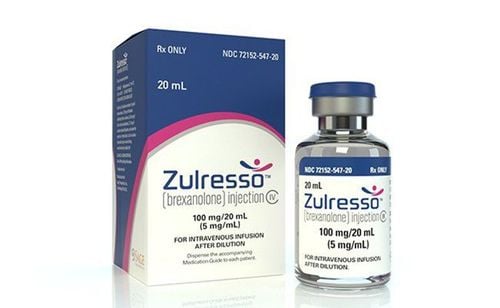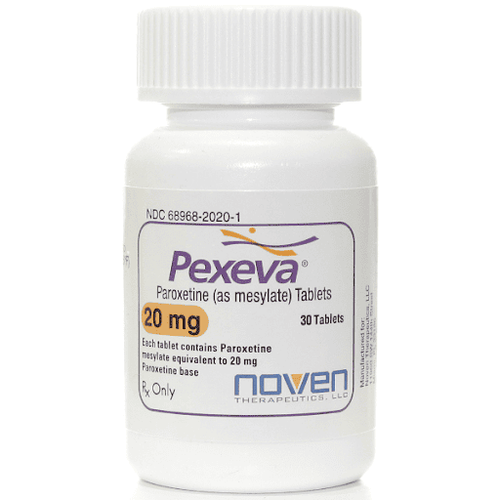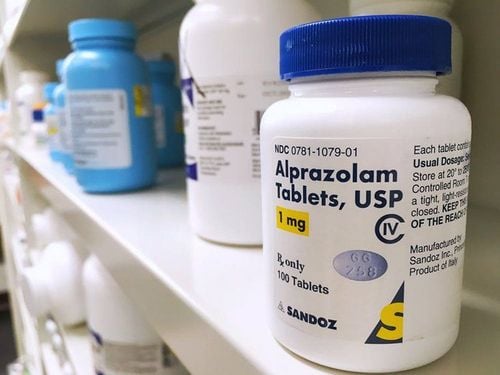This is an automatically translated article.
The article is professionally approved by Specialist I Pham Thi Yen - Obstetrician - Obstetrics and Gynecology - Vinmec Hai Phong International HospitalBeing a mother and taking care of a baby is one of the most joyful times in a woman's life. However, for many people, the experience is not always so great. Women can develop “baby blues,” depression, or postpartum psychosis.
1. Baby Blues or Postpartum Depression?
In fact, most new moms will experience the “baby blues” – when hormonal changes cause anxiety, crying, and restlessness within the first 2 weeks postpartum. Up to 85% of new mothers experience feelings of boredom. They may feel happy for a moment, then emotional, then cry the next. Experts say that no mother is always happy. It's normal to feel frustrated, lonely, and anxious, even needing to put your baby down for a moment. Also known as postpartum mood disorder, this is actually a mild and temporary form of depression that goes away once a woman's hormones return to normal.
If symptoms are severe or persist for more than 2 weeks, postpartum women should be careful about mood disorders, such as postpartum depression. One in five new mothers develop postpartum depression, which is a more severe and persistent but treatable mood disorder. Recent studies have identified differences in the activity of certain genes. This biomarker helps predict who is most at risk of developing postpartum depression. Women who experienced excessive anxiety or depression before giving birth have a higher risk of developing the condition when the baby is born.
Signs and symptoms of postpartum depression in women include:
Anxiety Sadness Anger and irritability Difficulty sleeping Decreased ability to concentrate Loss of memory Lethargy Intrusive thoughts (may be possible) is harming the baby, feeling unworthy for long, guilty of not being able to bond with the baby...) People tend to view depression in women as sadness, but experts claim this is not entirely true. The feeling can be similar to baby blues, but more intense. Depression or anxiety disorder occurs not only with the first child born, but also with subsequent children, when the daily activities of a new mother are affected.

Especially in the perinatal period, women have a lot of anxiety and frustration, plus lack of sleep, changes in hormone levels and thyroid problems, which have become very important risk factors. lead to postpartum depression. Although insomnia in new mothers is not necessarily a symptom of depression, it can make it worse.
2. Recognizing mental disorders in postpartum women
While baby blues and postpartum depression are relatively common, postpartum psychosis is extremely rare, affecting only 0.1% of new mothers. This number rises to 30% in women who have had bipolar disorder before. Postpartum psychosis is a third postpartum phenomenon to consider, with symptoms including:
Confusion and sudden cognitive decline Occasional loss of consciousness Extremely confusing, disorganized behavior Hallucinations or delusions This condition occurs within a few days to 3 weeks, as long as 3 months after birth. It's important not to ignore these symptoms, even if you don't have a history of mood disorders. Postpartum psychosis is also likely to occur in women with no history of mental illness, experts say. This is a psychiatric emergency that requires immediate medical attention as there is a very worrying rate of suicide and harm to the baby.
3. Treatment of postpartum mood disorder
Being diagnosed with postpartum mood disorder can take a long time from a happy family with a new baby. But most importantly, postpartum mood disorder is treatable. Moreover, the new mother need not feel ashamed of having contracted it. Even in the most severe cases, a recent study found that 98% of patients got better with treatment.
Baby blues erratic feelings may last only a few hours or for 1–2 weeks after birth, so no treatment is needed.
To treat postpartum depression in women, doctors often prescribe antidepressants that are safe while breastfeeding. Meanwhile, the standard treatment for postpartum psychosis is the use of both lithium (a mood stabilizer) and antipsychotics. With these medicines, it is important for the doctor to monitor the baby and make sure breastfeeding is safe.
4. Prevent Postpartum Mood Disorders
There is not enough research on how to prevent postpartum mood disorder, although it is becoming more common. For example, one study found that mothers who learned scientific methods of coaxing and lulling their babies to sleep had lower rates of postpartum depression. Another study showed that taking antidepressants during the postpartum period can help prevent anxiety disorders in women with a history of postpartum depression.
Maternal sleep is also an important factor, requiring postpartum care and attention to help prevent mood disorders. If a woman is found to be at risk for postpartum depression, the doctor will invite both of you to the clinic to proactively plan your sleep. Getting the right amount of sleep can make a difference in the prevention of an anxiety disorder. Women need to sleep for at least 4 hours straight and take care of the baby in shifts, or let their husbands do everything except breastfeeding.
The main message that doctors want to convey is that women should not be afraid to seek help from relatives and medical professionals. We need to break the stigma around depression and mental illness, especially for new mothers, to have any hope of effective treatment.
If the mother has health problems, psychological problems, depression after giving birth, she can go to Vinmec International General Hospital for a specialist health and psychological examination. Vinmec is an address for examination, consultation and treatment of psychological diseases and mental health that is chosen and appreciated by many people today.
As an outpatient treatment center, the clinic is invested with a system of modern equipment and facilities, in order to create a comfortable space for patients to examine and consult, to easily open their hearts and share their pressures. psychological force, effective support for the treatment process. The clinic owns a team of medical doctors, psychologists from leading hospitals and centers in the country. Among them are many lecturers and professors teaching psychiatry at Hanoi Medical University. With experience and high professional ability, the medical team at the Psychology clinic - Vinmec International General Hospital will help shorten the treatment process and improve treatment efficiency. The clinic is capable of deploying psychological tests and intensive psychotherapy for medical examination and treatment.
Please dial HOTLINE for more information or register for an appointment HERE. Download MyVinmec app to make appointments faster and to manage your bookings easily.
References: hopkinsmedicine.org, stanfordchildrens.org













